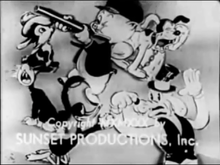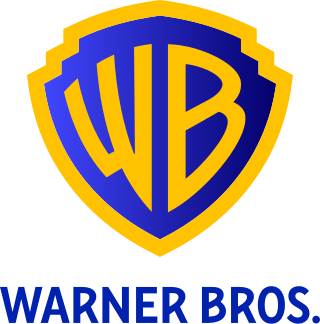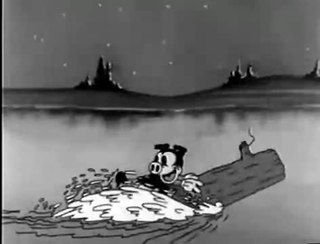
Sunset Productions, Inc. was a television production and licensing subsidiary of Warner Bros. Pictures [1] [2] headed by Jack M. Warner. [3] It was an entity separate from Warner Bros. Television. [4]

Sunset Productions, Inc. was a television production and licensing subsidiary of Warner Bros. Pictures [1] [2] headed by Jack M. Warner. [3] It was an entity separate from Warner Bros. Television. [4]
Sunset was originally established as a subsidiary of Warner Bros. that focused on television. [3] Its first production was a series of half-hour shows. [3]
On February 12, 1955, Warner Bros. sold the TV distribution rights to 191 of their black-and-white cartoons to Guild Films [5] through Sunset. [6] The cartoons part of the deal were all black-and-white Looney Tunes shorts and all black-and-white non-Harman-Ising Merrie Melodies shorts. All references to Warner Bros. in the cartoons were removed because Warner did not want to antagonize theater owners as a result of their television deals. [1] Guild Films would hold onto the TV distribution rights to the cartoons until its bankruptcy on March 6, 1961, [7] after which the TV rights to the 191 cartoons would be acquired by Seven Arts Productions. [8]
Sunset eventually began to produce TV commercials. In April 1957, Sunset Productions changed its name to Warner Bros. TV Commercial and Industrial Films. Jack M. Warner would continue to run the subsidiary. [9] [10]

Warner Bros. Entertainment Inc. is an American film and entertainment studio headquartered at the Warner Bros. Studios complex in Burbank, California, and a subsidiary of Warner Bros. Discovery (WBD). Founded in 1923 by four brothers, Harry, Albert, Sam, and Jack Warner, the company established itself as a leader in the American film industry before diversifying into animation, television, and video games, and is one of the "Big Five" major American film studios, as well as a member of the Motion Picture Association (MPA).

Looney Tunes is an American media franchise produced and distributed by Warner Bros. The franchise began as a series of animated short films that originally ran from 1930 to 1969, alongside the related series Merrie Melodies, during the golden age of American animation. Following a revival in the late 1970s, new shorts were released as recently as 2014. The two series introduced a large cast of characters, including Bugs Bunny, Daffy Duck, and Porky Pig. The term Looney Tunes has since been expanded to also refer to the characters themselves.

Merrie Melodies is an American animated comedy short film series distributed by Warner Bros. Pictures. It was part of the Looney Tunes franchise and featured many of the same characters. It originally ran from August 2, 1931, to September 20, 1969, during the golden age of American animation, though it was revived in 1979, with new shorts sporadically released until June 13, 1997. Originally, Merrie Melodies placed emphasis on one-shot color films in comparison to the black-and-white Looney Tunes films. After Bugs Bunny became the breakout character of Merrie Melodies and Looney Tunes transitioned to color production in the early 1940s, the two series gradually lost their distinctions and shorts were assigned to each series randomly.

The Censored Eleven is a group of Looney Tunes and Merrie Melodies cartoons originally produced and released by Warner Bros. that have been withheld from syndication in the United States by United Artists (UA) since 1968. UA owned the distribution rights to the Associated Artists Productions library at that time, and decided to pull these 11 cartoons from broadcast because the use of ethnic stereotypes in the cartoons, specifically African and African-American stereotypes, was deemed too offensive for contemporary audiences.
Turner Entertainment Company is an American multimedia company founded by Ted Turner on August 2, 1986. Purchased by Time Warner Entertainment on October 10, 1996, as part of its acquisition of Turner Broadcasting System (TBS), the company was largely responsible for overseeing the TBS library for worldwide distribution. In recent years, this role has largely been limited to being the copyright holder, as it has become an in-name-only subsidiary of Warner Bros., which currently administers their library.

Famous Studios was the first animation division of the film studio Paramount Pictures from 1942 to 1967. Famous was established as a successor company to Fleischer Studios, after Paramount seized control of the aforementioned studio amid the departure of its founders, Max and Dave Fleischer, in 1942. The studio's productions included three series started by the Fleischers—Popeye the Sailor, Superman, and Screen Songs—as well as Little Audrey, Little Lulu, Casper the Friendly Ghost, Honey Halfwitch, Herman and Katnip, Baby Huey, and the Noveltoons and Modern Madcaps series.

Warner Bros. Animation Inc. is an American animation studio which is part of the Warner Bros. Television Group, a division of Warner Bros. Entertainment, which is a subsidiary of Warner Bros. Discovery and serves as the animation division and label of Warner Bros.

Warner Bros. Television Studios, operating under the name Warner Bros. Television, is an American television production and distribution studio and the flagship studio of the Warner Bros. Television Group division of Warner Bros., a flagship studio of Warner Bros. Discovery (WBD). Launched on March 21, 1955 by William T. Orr, it serves as a television production arm of DC Comics productions by DC Studios and, alongside Paramount Global's CBS Studios, The CW, the latter that launched in 2006 and WBD has a 12.5% ownership stake. It also serves as the distribution arm of WBD units HBO, Cartoon Network and Adult Swim.
Warner Bros. Cartoons, Inc. was an American animation studio, serving as the in-house animation division of Warner Bros. during the Golden Age of American animation. One of the most successful animation studios in American media history, it was primarily responsible for the Looney Tunes and Merrie Melodies series of animated short films. The characters featured in these cartoons, including Bugs Bunny, Daffy Duck, and Porky Pig, are among the most famous and recognizable characters in the world. Many of the creative staff members at the studio, including directors and animators such as Chuck Jones, Friz Freleng, Robert McKimson, Tex Avery, Robert Clampett, Arthur Davis, and Frank Tashlin, are considered major figures in the art and history of traditional animation.

U.M. & M. TV Corporation was an American media company best known as the original purchaser of the pre-October 1950 short films and cartoons produced by Paramount Pictures, excluding Popeye and Superman. The initials stand for United Film Service, MPA TV of New Orleans, and Minot T.V.

Associated Artists Productions, Inc. (a.a.p.) later known as United Artists Associated was an American distributor of theatrical feature films and short subjects for television. Associated Artists Productions was the copyright owner of the Popeye the Sailor shorts by Paramount Pictures, and the pre-1950 Warner Bros. Pictures film library, notably the pre-August 1948 color Looney Tunes and Merrie Melodies series of animated shorts, and the black-and-white Merrie Melodies shorts from Hugh Harman and Rudolf Ising, excluding Lady, Play Your Mandolin!.

Screen Gems is an American film production company owned by Sony Pictures Entertainment, a subsidiary of Japanese multinational conglomerate, Sony Group Corporation. The Screen Gems brand has served several different purposes for its parent companies over the decades since its incorporation, initially as a cartoon studio, then a television studio, and later on as a film studio. The label currently serves as a film production that specializes in genre films, mainly horror.
United Artists Television (UATV) was an American television production/distribution studio of United Artists Corporation that was formed on January 1, 1958. The company is remembered for producing series such as This Man Dawson, World of Giants, Stoney Burke, The Outer Limits, Gilligan's Island, My Mother the Car, The Fugitive, The Rat Patrol, thirtysomething, The New Phil Silvers Show, The Patty Duke Show and The Pink Panther Show. In September 2014, the studio briefly returned to full-time TV production under the new management of United Artists Media Group (UAMG), led in part by husband and wife producers Mark Burnett and Roma Downey. With its folding back into MGM Television, UATV was temporarily dormant until 2020 when MGM Television was reincorporated.

The Metro-Goldwyn-Mayer cartoon studio was an American animation studio operated by Metro-Goldwyn-Mayer (MGM) during the Golden Age of American animation. Active from 1937 until 1957, the studio was responsible for producing animated shorts to accompany MGM feature films in Loew's Theaters, which included popular cartoon characters Tom, Jerry, Droopy, Butch, Spike, Tyke, and Barney Bear.

Warner Bros. Presents is the umbrella title for three series that were telecast as part of the 1955–56 season on ABC: Cheyenne, a new Western series that originated on Presents, and two based on classic Warner Bros motion picture properties, becoming Casablanca and Kings Row. The series ran from September 13, 1955, until September 4, 1956, or September 11, 1956.

Popeye the Sailor is an American animated series of short films based on the Popeye comic strip character created by E. C. Segar. In 1933, Max and Dave Fleischer's Fleischer Studios, based in New York City, adapted Segar's characters into a series of theatrical cartoon shorts for Paramount Pictures. The plotlines in the animated cartoons tended to be simpler than those presented in the comic strips, and the characters slightly different. A villain, usually Bluto, makes a move on Popeye's "sweetie", Olive Oyl. The villain clobbers Popeye until he eats spinach, giving him superhuman strength. Thus empowered, Popeye makes short work of the villain.
Daffy Duck and Porky Pig Meet the Groovie Goolies is a 1972 American animated one-hour television movie that was broadcast on ABC on December 16, as an episode of the anthology series The ABC Saturday Superstar Movie. In this Filmation-produced movie, Daffy Duck, Porky Pig, and other Looney Tunes characters interact with the characters from the Filmation series Groovie Goolies.

Vitaphone Varieties is a series title used for all of Warner Bros.', earliest short film "talkies" of the 1920s, initially made using the Vitaphone sound on disc process before a switch to the sound-on-film format early in the 1930s. These were the first major film studio-backed sound films, initially showcased with the 1926 synchronized scored features Don Juan and The Better 'Ole. Although independent producers like Lee de Forest's Phonofilm were successfully making sound film shorts as early as 1922, they were very limited in their distribution and their audio was generally not as loud and clear in theaters as Vitaphone's. The success of the early Vitaphone shorts, initially filmed only in New York, helped launch the sound revolution in Hollywood.

Kings Row is an hour-long American television period drama starring Jack Kelly, Nan Leslie and Robert Horton which was broadcast on ABC between September 13, 1955 and January 17, 1956 as part of the wheel series Warner Bros. Presents. It was the first of 20 filmed shows produced for ABC between 1955 and 1963 by Warner Bros Television, under the supervision of executive producer William T. Orr, Kings Row is also the only straight drama among those shows, whereas Westerns and detective/adventure series comprised 14 of the 20 productions.
Casablanca is an hour-long American television series, in the genre of spying and intrigue during the Cold War, which was broadcast on ABC between September 27, 1955 and April 24, 1956 as part of the wheel series Warner Bros. Presents. The third of 20 filmed shows produced for ABC, between 1955 and 1963, by Warner Bros. Television, under the supervision of executive producer William T. Orr, Casablanca is also the only one among those shows to be structured in the form of a non-U.S.-based Cold-War-intrigue storyline, while 14 of the 20 productions were western and detective/adventure series.